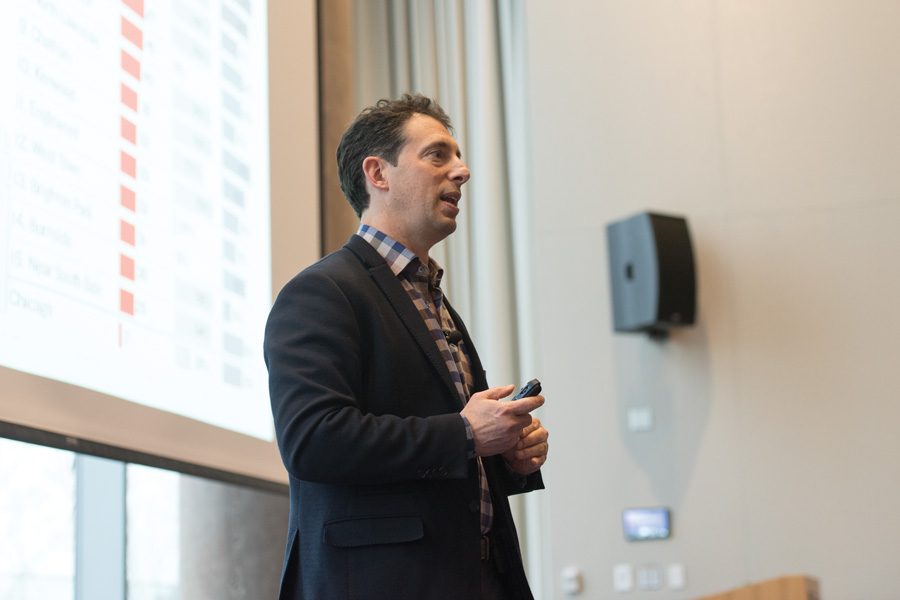Author Eric Klinenberg discusses climate change at event
Allie Goulding/The Daily Northwestern
Author Eric Klinenberg speaks during a One Book One Northwestern event. Klinenberg discussed the importance of preventative measures amid threatening climate change.
March 31, 2017
Novelist and New York University Prof. Eric Klinenberg said people need to improve infrastructure and raise political awareness to protect cities in the face of environmental changes during an event Thursday.
Klinenberg’s talk, sponsored by One Book One Northwestern, centered on a climate crisis in Chicago discussed in his 2002 book, “Heat Wave.” Speaking to about 100 people in the Segal Visitors Center auditorium, he honed in on the lack of foresight and preventative measures in climate-related catastrophes, such as the 1995 Chicago heat wave and, more recently, Hurricane Sandy.
One Book One Northwestern director Nancy M. Cunniff said the event was organized as a part of year-long programming in relation to Nate Silver’s “The Signal and the Noise.” She said Klinenberg’s work runs parallel to Silver’s prediction-focused research, as his environmental writing centers on climate predictions.
“It’s a good fit because one of the areas that Nate Silver discusses is climate change,” Cunniff told The Daily. “In the case of the Chicago heat wave, hundreds of lives could have been saved if the city had prepared themselves through accurate predictions.”
Cunniff said supplementary programming, such as Klinenberg’s talk, is relevant to the entire Evanston community. Though the office is aimed predominantly toward students, authors like Klinenberg connect the message of the One Book program to relevant issues in the Chicago area, she said.
During the event, Klinenberg said he recognized that environmental prediction methods can be flawed. Regarding catastrophes like the 1995 heat wave, however, Klinenberg said the main problem was a lack of social urgency surrounding environmental issues.
“We lack the political will to take necessary steps to solve imminent issues,” he said. “The moment that climate change does feel urgent enough to drive action, we’re already toast.”
Klinenberg encouraged design thinking –– an approach that utilizes creative strategies to solve problems –– to bolster infrastructure and prepare for disasters, such as innovative barrier walls built to prevent floods.
“To mitigate potential risks in the environment, we need to adapt and transform our preventative efforts,” Klinenberg said.
Klinenberg urged students in the audience to take advantage of the University’s resources to tackle the “plentiful and exciting” issues in our environment’s future.
McCormick freshman Kelly Davis, who attended the event, said she hopes her studies as an environmental engineering major will empower her to prevent natural disasters.
“I’m still looking for ways to become politically aware and environmentally active,” Davis said. “I’m hoping that the Northwestern curriculum will delve into issues like these.”
Email: annalaffrey2020@u.northwestern.edu
Twitter: @annalaffrey



